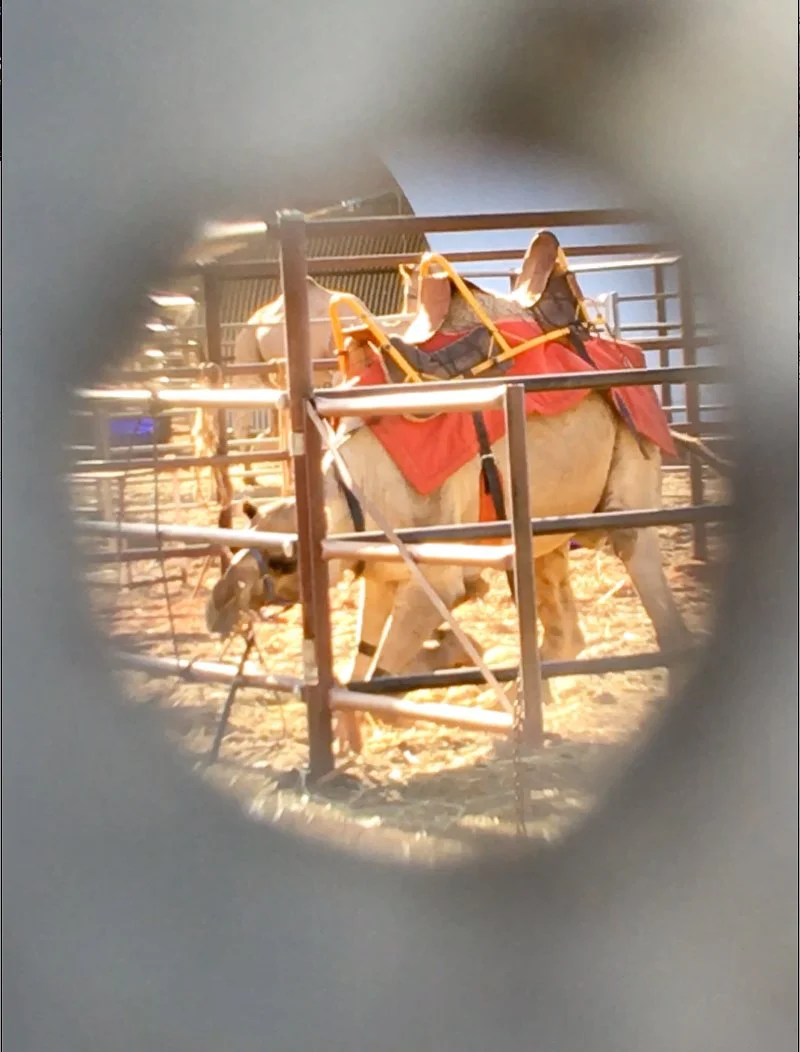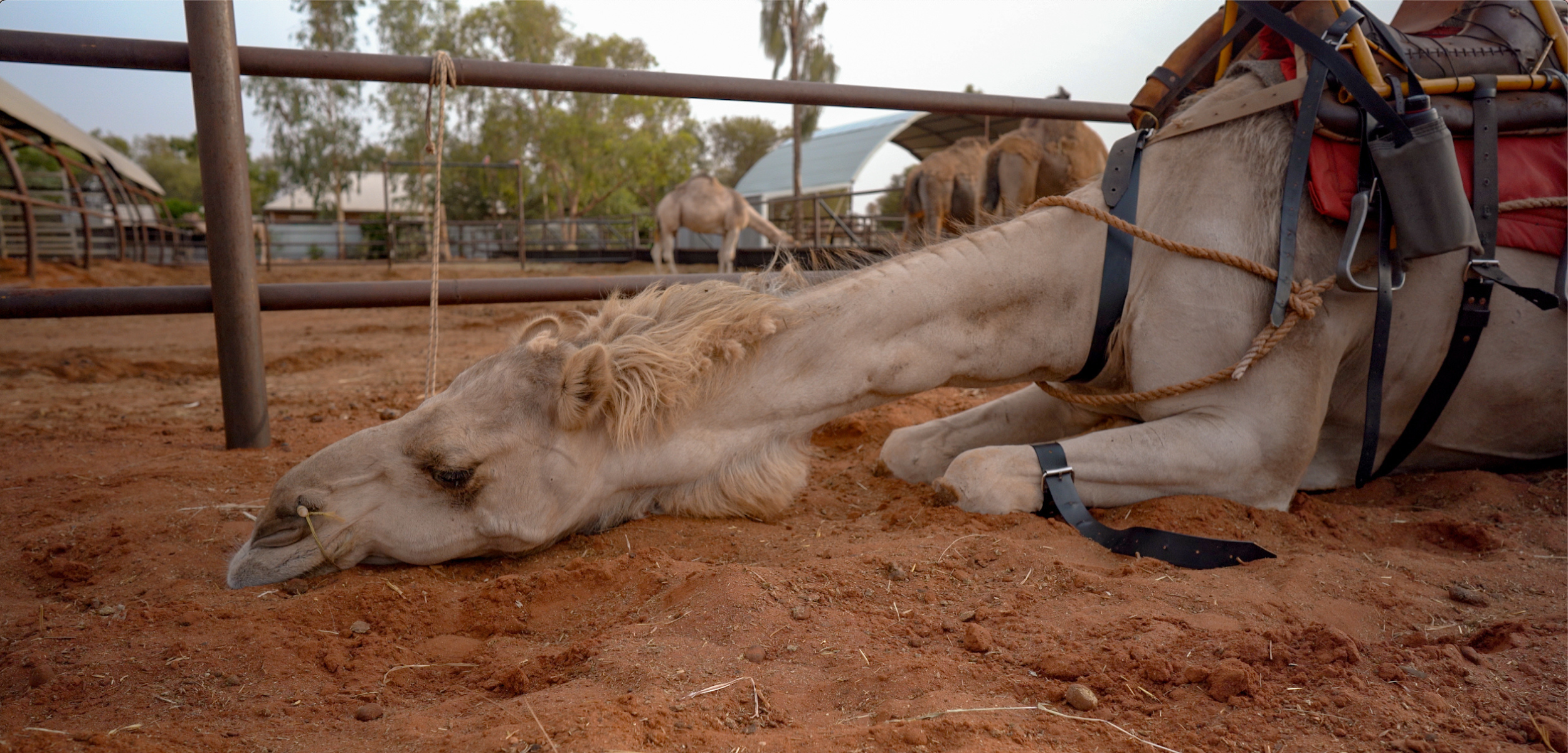
BREAKING THE CAMEL’S BACK
Animal Liberation’s Australian-first investigation exposes
the dark side of camel tourism.
Shocking footage shows wild camels captured, roughly handled, expressing pain and distress, psychologically ‘broken’, and forced into servitude by Uluru Camel Tours in Yulara, Northern Territory.
These revelations draw direct parallels to other unethical animal tourism attractions in Australia and overseas. This investigation highlights some of the issues inherent in animal-based tourism as well as the lack of animal welfare regulation and oversight within the industry.
TRIGGER WARNING: This footage includes graphic and potentially distressing material.
To watch the 8 minute exposé and investigation, click here.
Take action
Help us to change hearts and minds - your voice is important in helping create a kinder world for the animals. Please join us in taking the following actions.
-
Please sign our petition calling upon the Hon. Jullie Collins, Minister for Agriculture, Fisheries and Forestry, to overhaul and reform laws for animals used and exploited by the tourism industry and regulate all animal-based tourism.
-
Donate to our Australian-first ‘Breaking the camel’s back’ campaign to help us raise awareness about the suffering of camels in Australia’s animal tourism and advocate for animal welfare reforms and regulation.
-
Demand urgent intervention and action from the NT Government by sending a direct email to NT Ministers and Shadow Ministers
-
Join us by taking the Travel Kindly pledge to not support the use of animals in unethical animal-tourism.

“We were told to lie to the tourists about the welfare of the camels”
- whistleblower -
About the Uluru Camel Tours investigation
Animal Liberation was contacted by a whistleblower regarding alleged animal cruelty concerns they witnessed. To validate the alleged animal cruelty claims, we sent our campaign researchers to the tourist attraction to witness the alleged cruelty firsthand and gather more evidence against the facility.
After reviewing their evidence, we identified potential breaches of the Model Code of Practice (‘the Model Code’) for the Welfare of Animals: The Camel (2006) and the Northern Territory Animal Welfare Act 1999. We also consulted with independent agents and provided information to the Northern Territory Department of Industry, Tourism, and Trade. The Department initiated an investigation into the allegations and laid three charges against the operator: two counts of failing to meet the duty of care and one count of animal cruelty. These charges, however, were withdrawn prior to the Northern Territory court hearing.
To ensure adherence to justice and the law, Animal Liberation made a deliberate and conscious decision to delay making the details of our in-depth investigation public for a period of approximately two (2) years. The delay included two (2) court case adjournments and then the withdrawal of the charges on 22 February 2023. Our investigation findings and the decision not to proceed with the charges demonstrate the urgent need for independent animal welfare oversight as well as strengthened and specific animal welfare legislation that can be enforced. There were no findings against Mr Hill in relation to that matter.
We also contacted Tripadvisor, marketed as the world's largest travel site, and outlined our allegations relating to breaches of Tripadvisor's Animal Welfare Policy, as outlined on their Animal Welfare Education Portal. Tripadvisor has since removed the ability to purchase tickets for Uluru Camel Tours from their website.
Uluru Camel Tours should be held accountable for what we maintain and allege is the cruelty inflicted on, and the extensive suffering experienced by these Australian free-roaming camels. As consumers, it is up to all of us to demand justice and the ethical treatment of all animals. Please join Animal Liberation in calling upon the Hon. Murray Watt, Federal Minister for Agriculture, Fisheries and Forestry to undertake an urgent review of animal welfare legislation and the Model Code with public input.

“I often heard staff talk and laugh about putting really heavy people on their least favourite camel and watching them struggling to stand”
- whistleblower -
What our investigation revealed
Learn more about Animal Liberation’s three-year investigation into Uluru Camel Tours:
-
Dromedary camels established a healthy population after being discarded and released into the Australian outback in the 1940s. Businesses like Uluru Camel Tours capture the free-roaming camels. During our investigation, we documented Uluru Camel Tours owner, Christopher Hill, and his staff setting up traps around a water source. Once trapped, decisions are made about which camels will be sent to slaughter and which ones will be used for camel rides. To force the terrified camels on the truck, our footage shows the use of a bobcat and staff using rakes and electric jiggers.
-
The camels who are kept for tours go from a life of freedom to one of confinement, training, tethering, and forced work. As nomadic animals, camels travel thousands of kilometres each year. At Uluru Camel Tours, they are confined to small barren pens with no enrichment. They are forced to live among camels from different social groups, resulting in high levels of stress and frustration.
In the wild, camels often seek refuge from the sun during peak temperatures. Our footage shows some camels on the farm, being denied the opportunity to seek shelter from the elements, as some pens lack any shade or shelter. Some were even left tethered to railings, unable to escape the extreme weather.
The whistleblower noted that their water was often in the sun and their intake of food and water is highly controlled. The camels are also fed an exclusive diet of hay, which can cause nutritional deficiencies, as their natural diet consists of a wide variety of vegetation.
-
Camels undergo surgical procedures to make them easier for workers to control and ‘safe’ for interactions with tourists. At Uluru Camel Tours, some camels undergo genital castration, nose pegging, and iron branding. The footage shows the owner of Uluru Camel Tours castrating adult camels. According to the witness statement, they did not see anaesthesia or pain relief used in these processes while they observed them. Nose pegging involves puncturing a hole through the camel’s nostril, through which a peg is then inserted and attached to a rope, to direct camels during tours. As their noses are sensitive, pulling the nose pegs is likely to cause them pain.
Additionally, the RSPCA states in its position paper Painful Farm Animal Husbandry Procedures (2021) that “the castration of deer, donkeys, horses and camelids of all ages is considered a major surgical procedure and must only be performed under anaesthetic by a veterinary surgeon”.
-
To train wild camels to be suitable ‘tourism machines’, they are physically and mentally broken down. Camels are considered to be stubborn and disobedient animals and the staff told investigators that ‘breaking them down’ can take between six to eighteen months.
According to the whistleblower and their evidence, training methods include:
depriving the camels of food and water to weaken them and make them easier to control;
punishment, such as constant tethering, withdrawal of food and water, pulling on the nose peg, and hitting;
repetition and reinforcement of words and actions by trainers and;
using food and/or water as a reward.
The combination of these methods results in a fear dynamic between the human and camel.
The camels are first taught to lay down and stand on command before having the saddle placed on their back. They are then ‘broken in’ with tyres attached to the saddles to prepare them for carrying people. During this stage of the training, camels frequently attempt to escape while being mounted by a trainer. This process is repeated for several months before it becomes the animal’s daily ritual when they begin working. The staff control the camel's head by using a halter and/or tether which is attached to the nose peg.
-
At Uluru Camel Tours, up to 250 people ride these camels nearly every day. Most camels are made to provide up to four rides a day, carrying up to 300kg at a time. The tour operator owner ensures that a camel will be available whenever there is someone there to pay for a ride. As their sole purpose is to generate income for the business owners, camels used for tourism are routinely overworked. They are also considered to be replaceable, which leaves little incentive for them to be properly cared for or rested.
-
According to the witness statement, Uluru Camel Tours has a high staff turnover due to its remote location. As a result, its employees often have a lack of knowledge and experience when handling the camels. Video evidence shows some staff resorting to rough treatment – hitting, kicking, whipping, pulling, pinching and deliberately harassing the camels in an effort to force them to comply. The camels frequently vocalise their frustration, while others gave the staff a warning as if they were going to bite them. The staff pass off their vocalisations as saying “hello” to the tourists. Staff also told investigators that they cannot give in to those who resist, as they learn that this gets them out of work and then others are influenced to do the same.
-
There is no standard retirement plan for animals in the tourism industry. The whistleblower stated that their ‘retirement’ will only ever take place when they die, suffer serious injury, or become too ill to perform their expected duties. Investigators met ‘Jack’, a 40+-year-old camel at Uluru Camel Tours, who was kept to train new camels during tours. In our view, the few who do end up in rescue situations will spend their few remaining years suffering from the physical and mental scars of their past.
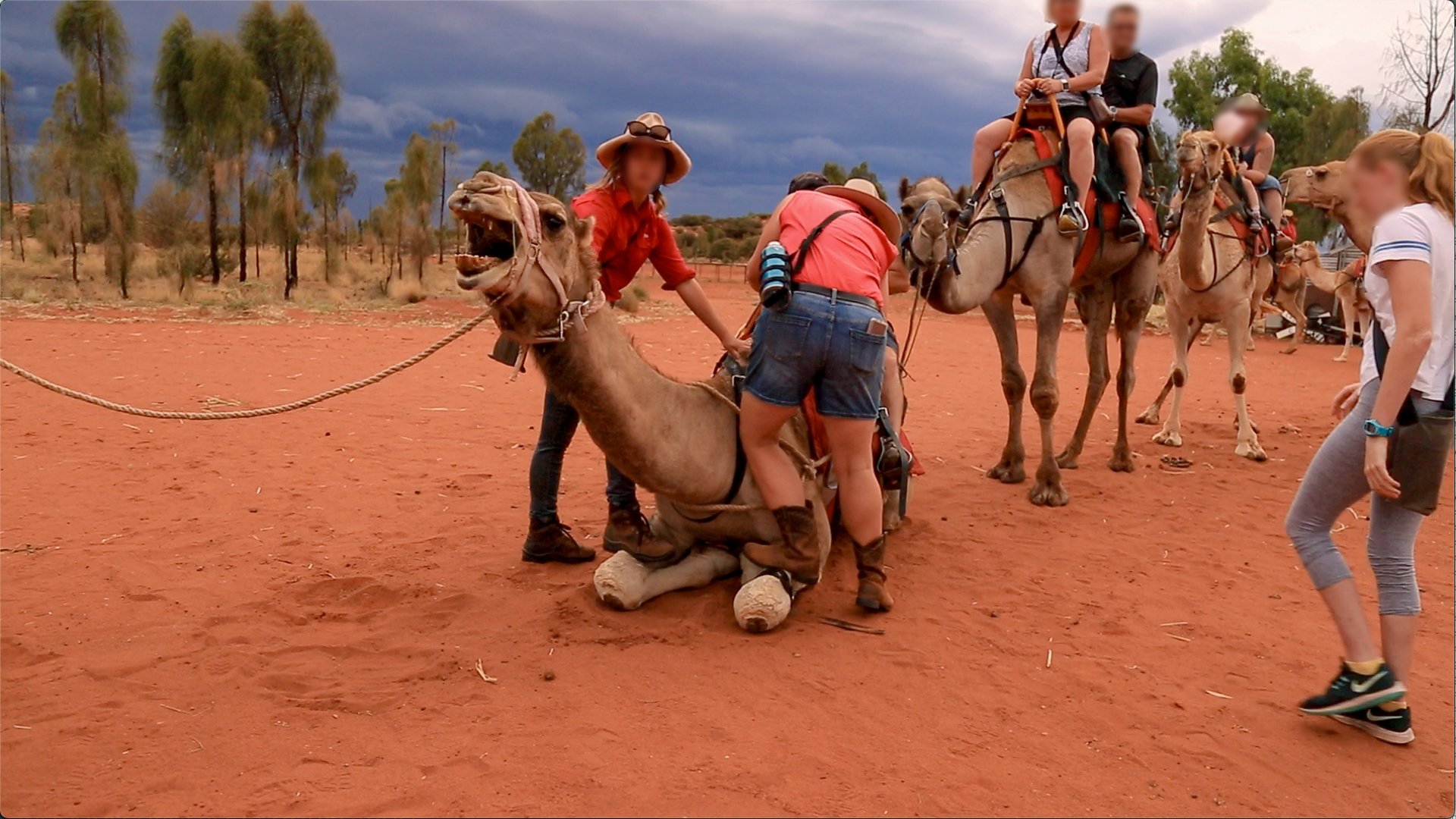
“The camel's soul is completely destroyed, having had everything taken away from them including their dignity, natural behaviours, family and friends”
- whistleblower -
Why we are running this campaign
Animal Liberation’s mission is to permanently improve the lives of all animals through education, action, and outreach; including progressive reforms to ensure humane outcomes for all sentient beings and public accountability of legislators, regulators, and industries.
In this regard, our actions are not intended to disparage any specific entity but rather to advocate for robust and enforceable legislative changes that can better safeguard the welfare of camels, ensuring their humane treatment and well-being in the animal tourism industry.
To enable progressive and meaningful reform for camels, we need to understand the issues. Currently, many camels in the camel tourism industry are exploited and can suffer pain and cruelty – the laws intended to protect camels and prevent cruelty are inadequate and outdated. We strongly contend that it is in the public interest to advocate for animal welfare reforms due to the inadequate legal protections currently afforded to camels, certainly in the Northern Territory (‘NT’), but more generally, across Australia.
Under the NT’s Animal Protection Act 2018 (‘Act’) and Animal Protection Regulations 2022 (‘regulations’), animals in the NT are entitled to a standard of care for their welfare, health and safety. This legislation stipulates that, if you’re in charge of any animal – wild, farmed or a family pet – you must make sure they:
have appropriate and sufficient food and water
have appropriate accommodation and living conditions
are appropriately treated for disease or injury or when suffering
are allowed appropriate exercise
are handled appropriately
confined or restrained only in ways that are appropriate
are worked, ridden or used only in ways that are appropriate
are not in an organised animal fight
are not abandoned.
Similarly, the Model Code of Practice for the Welfare of Animals: The Camel (second edition, March 2006) is outdated and completely inadequate to both protect the welfare and well-being of camels, and/or prevent cruelty towards them.
The Act and Regulations are managed by the Department of Industry, Tourism and Trade, (‘Department’), so in effect the same government agency oversees both the ‘welfare’ and the ‘tourism’ related to camels. Such a framework could be reasonably considered to constitute a conflict of interest with competing responsibilities and priorities.
The NT Government, in fact, refers to camels as ‘feral’ and a ‘hardy pest’, and claims the ground and aerial shooting of camels is “the most effective and humane way to cull large feral herbivores in remote areas that are hard to access.” The NT Government also confirms that the “live harvest and export of feral camels for commercial sale” is currently estimated to be approximately 5,000 camels a year, but claims that “this has potential to grow.”
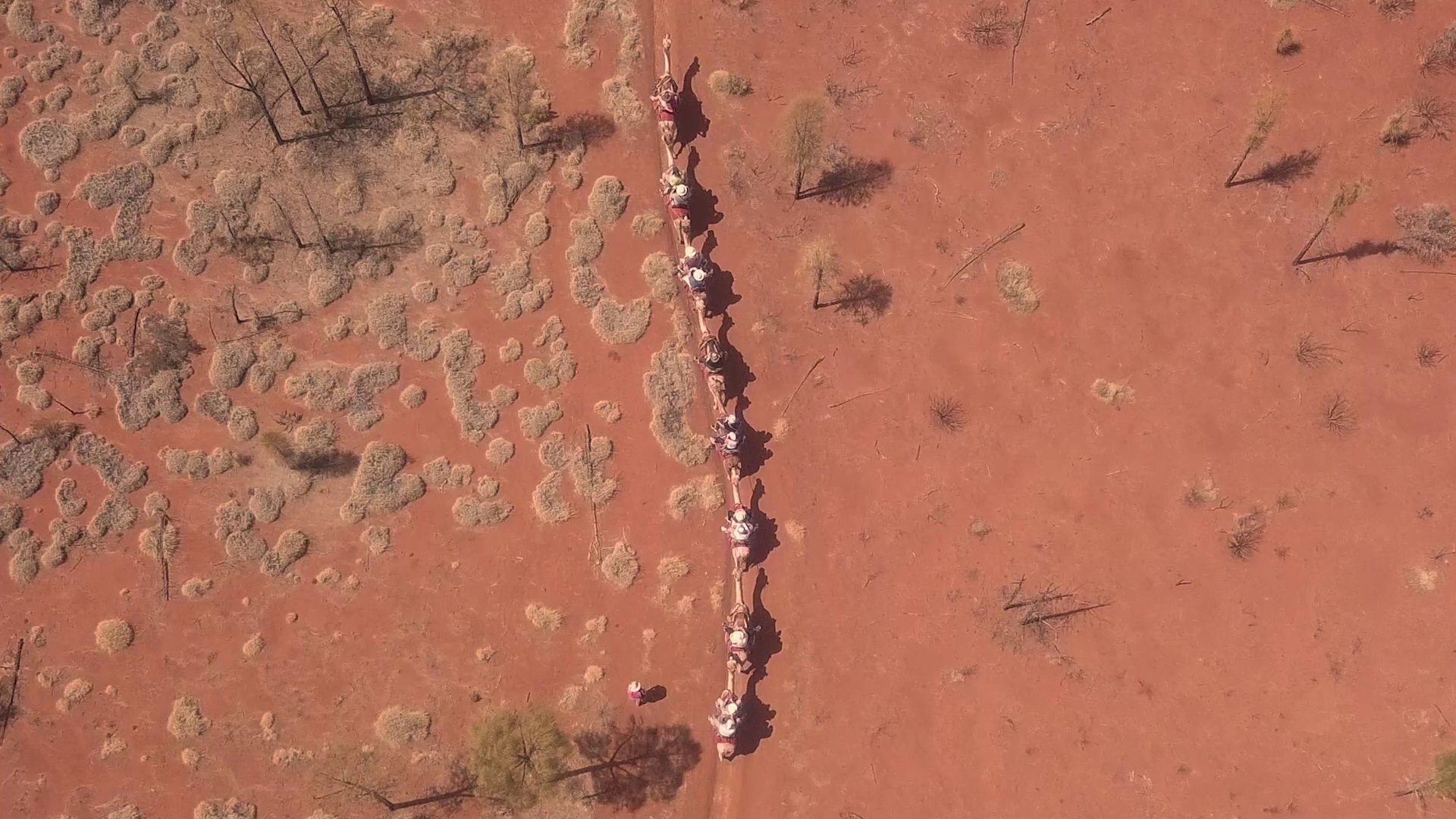
Animal Liberation is calling for:
Select an option below to learn more about our key campaign demands:
-
A comprehensive independent investigation into matters surrounding the NT Department’s handling and management of the animal welfare issues at Uluru Camel Tours we raised with them in February 2019, including their investigation and decision to withdraw the animal cruelty charges
-
An Inquiry at Commonwealth Government level into the risks and impacts to the welfare and well-being of animals used in Australian Tourism ventures, and the risks to consumer protection (including domestic and international tourists)
-
The urgent need to publicly review (through a public consultation process) and update the Model Code of Practice for the Welfare of Animals: The Camel, to bring it into alignment with public expectations and Veterinary science encouraging the incorporation of the Code into all Commonwealth, State and Territory animal welfare legislation;
-
To remove the power of industries with a vested financial interest to self-govern animal welfare issues within the same industry
-
When and where evidence is provided and proven, perpetrators of animal cruelty are held to account with appropriate and objective investigative processes and outcomes, with full public transparency.
Why have we gone public?
The urgent need for legislative reform to protect the welfare and well-being of camels, to hold governments, regulators, and industry to account, and to protect consumers.
The concept of “injustice’ anywhere is a threat to justice everywhere” (Martin Luther King Jr), forms the basis of Animal Liberation’s camel tourism campaign. These suffering camels need our collective voices and public transparency has the power to raise awareness, educate, and drive progressive change for animals. A failure to enforce animal welfare laws enables ongoing animal pain and suffering and in many instances, consumer awareness can contribute to a better outcome for the animals after animal protection laws have failed them.
TRIGGER WARNING: This footage includes graphic and potentially distressing material.
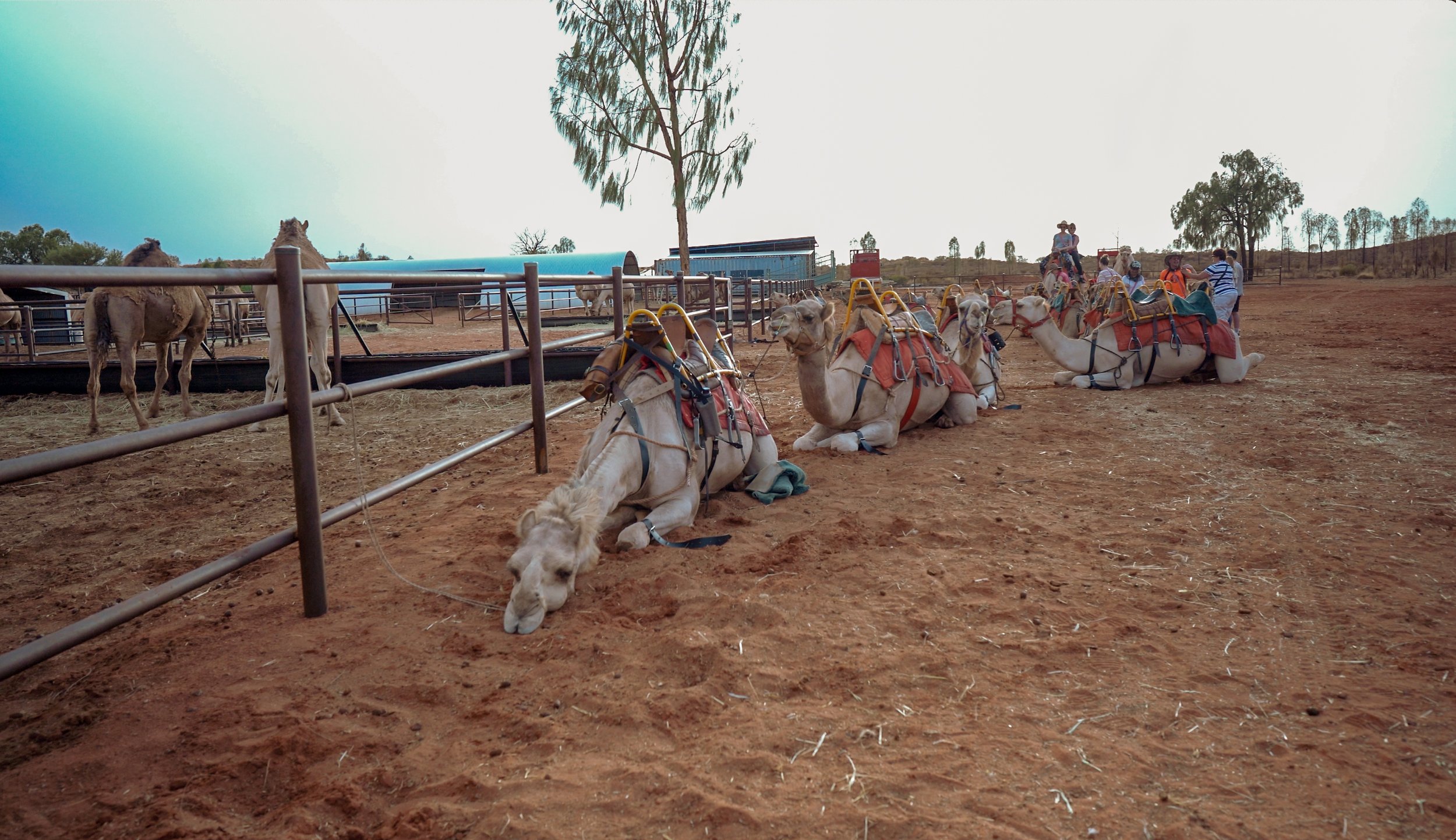
“We were trained to lie to the tourists about the welfare of the camels, for example, we would say that ‘they get many days off’, ‘a vet comes to check them’, ‘they get retired’, ‘nose pegs don’t hurt them’, and ‘they love their job’”
- whistleblower -
How to report animal tourism cruelty
Have you witnessed animal cruelty at a tourist location?
Please report it to our team, or send us an encrypted email at animallibnsw@protonmail.com.
How to be our eyes and ears for the camels
Have you witnessed any advertising for camel rides or other animal-tourism ventures?
Please report it to our Regional Campaigns Manager, Lisa Ryan: lisa.r@animal-lib.org.au.




